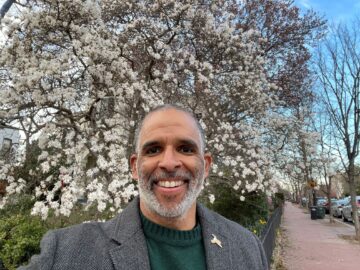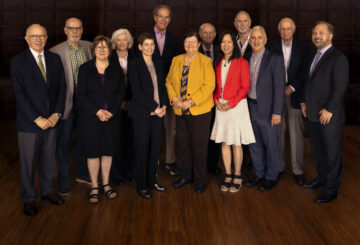 Steven Dean will join the faculty of the Boston University School of Law this fall after being a professor at Brooklyn Law School since 2004. His latest book “For-Profit Philanthropy: Elite Power and the Threat of Limited Liability Companies, Donor-Advised Funds, and Strategic Corporate Giving” (with Dana Brakman Reiser) was published by Oxford University Press in January. He has testified before the U.S House Ways and Means Committee and been a consultant to the Organization for Economic Cooperation and Development. At Brooklyn Law Dean serves as Co-Director of the Dennis J. Block Center for the Study of International Business Law. He serves as a member of the Executive Committee of the New York State Bar Association’s Tax Section. While leading NYU’s Graduate Tax program he hosted the podcast The Tax Maven. Dean graduated from Yale Law School and earned his undergraduate degree in Political Economy at Williams College. He practiced tax law at Debevoise & Plimpton and Cravath, Swaine & Moore. Before law school he worked with KPMG’s transfer pricing group
Steven Dean will join the faculty of the Boston University School of Law this fall after being a professor at Brooklyn Law School since 2004. His latest book “For-Profit Philanthropy: Elite Power and the Threat of Limited Liability Companies, Donor-Advised Funds, and Strategic Corporate Giving” (with Dana Brakman Reiser) was published by Oxford University Press in January. He has testified before the U.S House Ways and Means Committee and been a consultant to the Organization for Economic Cooperation and Development. At Brooklyn Law Dean serves as Co-Director of the Dennis J. Block Center for the Study of International Business Law. He serves as a member of the Executive Committee of the New York State Bar Association’s Tax Section. While leading NYU’s Graduate Tax program he hosted the podcast The Tax Maven. Dean graduated from Yale Law School and earned his undergraduate degree in Political Economy at Williams College. He practiced tax law at Debevoise & Plimpton and Cravath, Swaine & Moore. Before law school he worked with KPMG’s transfer pricing group
Five Questions for Steven
How did you decide to specialize in tax law as a career?
After graduating from Williams with a degree in political economy, I worked for economists at the United Nations and in the private sector. Some of those economists happened to be at KPMG, working in transfer pricing. They worked alongside tax lawyers. I quickly realized that I wanted to understand how tax law worked and why the rules governing the taxation of multinationals were structured as they were. I applied to law school and never looked back!
What advice do you have for others considering to embark on the career path you have chosen?
I would encourage those considering a career in tax law not to be discouraged by the lack of diversity in the field. For years, I stopped presenting at and attending NTA meetings after encountering a few hostile individuals. But I have found that for every negative encounter I have had, I have had more supportive interactions with colleagues in the field, including at the NTA. Since becoming a member of the board I have found the organization surprisingly receptive to change.
As I have gotten more senior, I have become more outspoken on issues such as the impact of anti-Black racism on domestic and international tax policy. For example, in my latest piece, “Surrey’s Silence: Subpart F and the Swiss Subsidiary Tax that Never Was“, I question whether Stanley Surrey knowingly exploited racial bias in others for political advantage. I have found speaking plainly to be much more impactful than the non-confrontational approach I had favored as a more junior scholar. Everyone needs to find a balance between being forthright and conciliatory that feels right for them, but I do not regret the loss of friends and mentors that have turned their backs on me. Instead, I mourn the time and effort I devoted to relationships with people who never really knew or respected who I am. Be yourself and always try to say what you really believe. Even in a field as homogenous as tax law, you will manage to build real connections with people who understand you. And you might even end up on the board of an organization you once believed did not have a place for you.
What major unaddressed questions/topics do you think should be part of (or receive more emphasis in) your profession’s research agenda?
Tax law has only begun to grapple with the impact of race. The work of senior scholars such as Dorothy Brown and Francine Lipman and junior scholars like Jeremy Bearer-Friend have opened eyes and prompted research like the recent Stanford study showing that Black Americans are far more likely to be audited than whites.
My work focuses on the impact of race and racism in international tax policy. Organizations such as the OECD have a poor track record on such matters, never having had a majority Black member and having been excoriated by most of the members of the US Congressional Black Caucus for threatening sanctions on innocent Black states like Liberia but not Ireland or Switzerland. Understanding the role of leading institutions and individuals in embedding racial bias in international tax rules is important. While looking through the Stanley Surrey papers at Harvard, I found that he did the same, obscuring the role of Switzerland in corporate tax avoidance and standing by while the press focused attention on the Bahamas (where I spent my childhood). Even if not motivated by racial bias—I certainly don’t have any reason to believe that Surrey held notably racist views—such actions (and inactions) by powerful actors can have lasting and damaging effects, here distorting decades of efforts to curb corporate tax avoidance. We need to understand that in order to avoid repeating their mistakes.
What are your views on inter-professional collaboration (e.g., between lawyers and accountants, lawyers and economists)?
I think inter-professional collaboration is so important, and not just because I wouldn’t be a tax lawyer if it weren’t for the fact that I worked with lawyers and economists at an accounting firm! The authors of the Stanford study on racial bias in audits have said that their work was motivated by Dorothy Brown’s. They did not work together, but I still see the results as testimony to the power of bringing together the creativity and rigor of these two fields to produce impactful insights.
Outside of work, what is an interest or hobby you enjoy?
I bake a lot. When I led NYU’s Graduate Tax Program, they were so struck by it that their media team produced this video. I learned to bake from my mom and older sisters and still enjoy the magic of producing a biscotti from a few simple ingredients.
__________________________________________________________________________________________
Catch up on past NTA Member Spotlights:
![National Tax Association [ National Tax Association ]](https://ntanet.org/wp-content/themes/nta-custom/library/images/nta-whitebg-web-top.svg)


![National Tax Association [ NTA ]](https://ntanet.org/wp-content/themes/nta-custom/library/images/nta-white-logo.svg)